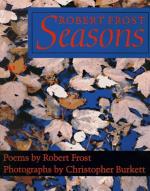|
This section contains 1,229 words (approx. 5 pages at 300 words per page) |

|
[What Frost did] to American poetry was to insist that a poem must have definite form, be dramatic, and use voice tones to vary the "te tum" effect of traditional iambic meter. Although all three prescriptions reflect his belief that poetry should include the intonation of the speaking voice, his concern with form has philosophical implications as well. Frost writes about confusion, about the universal "cataract of death" that spins away to nothingness. Yet while he faces the chasm, he refuses to accede to its lure. Confusion is a universal state to be acknowledged as a kind of boundary against which man can act by creating form. No form is permanent, as Frost suggests in his famous phrase "a momentary stay against confusion," but man may delight in chaos because it provides the opportunity for form. (p. 5)
When Frost applies his ideas about form to the art of...
|
This section contains 1,229 words (approx. 5 pages at 300 words per page) |

|


